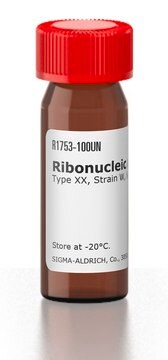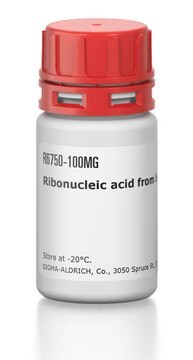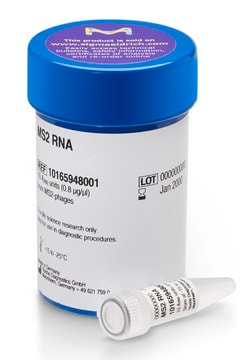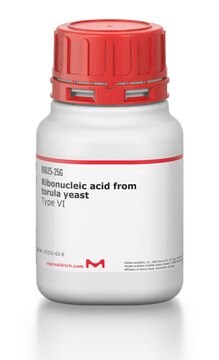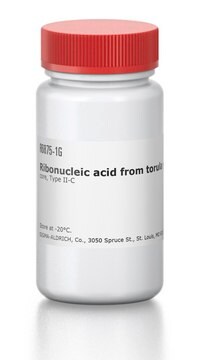R8759
Ribonucleic acid, transfer from baker′s yeast (S. cerevisiae)
Type X-SA, lyophilized powder
Sinonimo/i:
Transfer RNA, tRNA
Autenticatiper visualizzare i prezzi riservati alla tua organizzazione & contrattuali
About This Item
Prodotti consigliati
Tipo
Type X-SA
Stato
lyophilized powder
Temperatura di conservazione
−20°C
Cerchi prodotti simili? Visita Guida al confronto tra prodotti
Categorie correlate
Applicazioni
Ribonucleic acid, transfer from baker′s yeast S. cerevisiae may be used as a starting material for the purification of specific amino acyl-tRNA species by methods such as liquid column chromatography or high-performance liquid chromatography (HPLC).
Definizione di unità
One unit will yield an A260 of 1.0 in 1.0 mL of water (1 cm light path).
Nota sulla preparazione
Prepared by a modification of the procedure of Hancher, C.W., et al., Biotechnol. Bioeng., 11, 1055 (1969).
Codice della classe di stoccaggio
11 - Combustible Solids
Classe di pericolosità dell'acqua (WGK)
WGK 3
Punto d’infiammabilità (°F)
Not applicable
Punto d’infiammabilità (°C)
Not applicable
Dispositivi di protezione individuale
Eyeshields, Gloves, type N95 (US)
Scegli una delle versioni più recenti:
Possiedi già questo prodotto?
I documenti relativi ai prodotti acquistati recentemente sono disponibili nell’Archivio dei documenti.
I clienti hanno visto anche
Maureen A Sartor et al.
Nucleic acids research, 34(1), 185-200 (2006-01-07)
The recent sequencing of a large number of Xenopus tropicalis expressed sequences has allowed development of a high-throughput approach to study Xenopus global RNA gene expression. We examined the global gene expression similarities and differences between the historically significant Xenopus
Ofri Levi et al.
Nucleic acids research, 49(1), 432-443 (2020-12-12)
Modification of nucleotides within an mRNA emerges as a key path for gene expression regulation. Pseudouridine is one of the most common RNA modifications; however, only a few mRNA modifiers have been identified to date, and no one mRNA pseudouridine
Violaine I Mottier-Pavie et al.
Developmental biology, 417(1), 50-62 (2016-07-02)
The mechanisms that modulate and limit the signaling output of adult stem cell niches remain poorly understood. To gain further insights into how these microenvironments are regulated in vivo, we performed a candidate gene screen designed to identify factors that
Jaclyn M Fingerhut et al.
PLoS genetics, 15(5), e1008028-e1008028 (2019-05-10)
Intron gigantism, where genes contain megabase-sized introns, is observed across species, yet little is known about its purpose or regulation. Here we identify a unique gene expression program utilized for the proper expression of genes with intron gigantism. We find
Jean Lehmann et al.
Nucleic acids research, 41(10), 5494-5502 (2013-04-13)
The structure and function of conserved motifs constituting the apex of Stem I in T-box mRNA leaders are investigated. We point out that this apex shares striking similarities with the L1 stalk (helices 76-78) of the ribosome. A sequence and
Il team dei nostri ricercatori vanta grande esperienza in tutte le aree della ricerca quali Life Science, scienza dei materiali, sintesi chimica, cromatografia, discipline analitiche, ecc..
Contatta l'Assistenza Tecnica.
